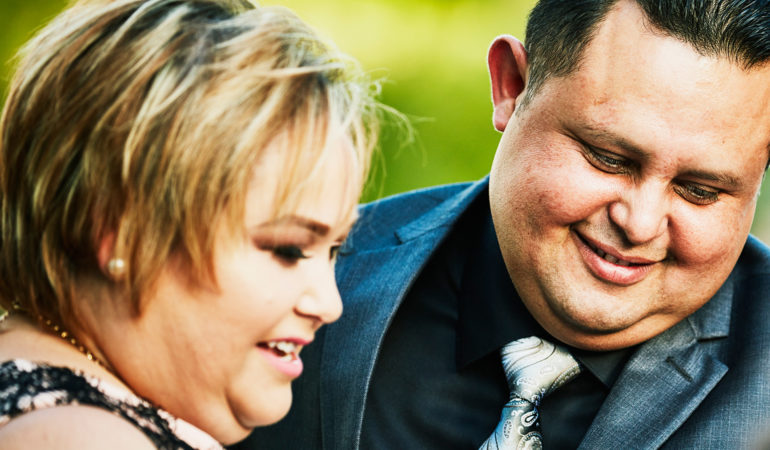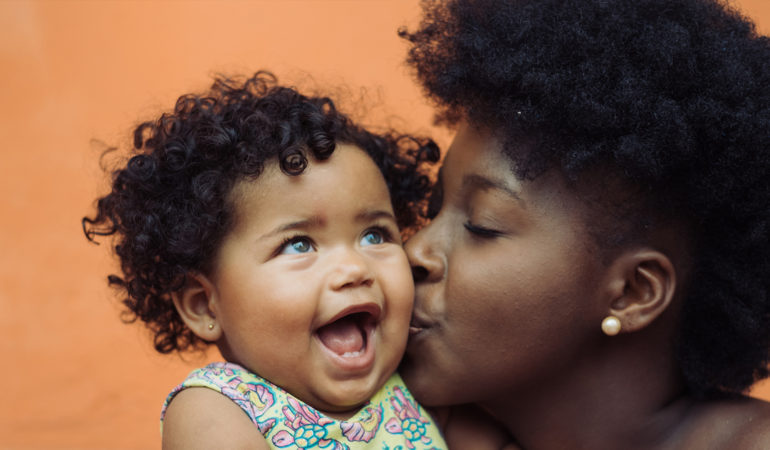Based on: Couple and family interventions for depressive and bipolar disorders: Evidence base update (2010-2019). Andrea K. Wittenborn, PhD, Sarah B. Woods, PhD, Jacob B. Priest, PhD, Preston C. Morgan, PhD, Chi-Fang Tseng, MS, Patricia Huerta, PhD, and Caitlin Edwards, MA | January 2022 Journal of Marital and Family Therapy
Among those who experience depressive or bipolar disorders, too few get the treatment they need to experience relief. When people do seek treatment, it’s commonly in the form of medication, individual therapy, or both. Online searches for treatment options describe symptoms, the process of diagnosis, and effective types of psychotherapy—especially individual and group modalities. Far fewer results guide prospective clients toward couples or family therapy as treatment options—despite the reciprocal relationship between the quality of our close relationships and our mood.
For example, we know that stressful family relationships contribute to the development and maintenance of depression and mania. Family strain may also reduce treatment response: persons with comorbid depression and relationship stress are less likely to achieve symptom relief following therapy than those without relationship distress (Denton et al., 2010). Conversely, depressive and bipolar disorders can create a great deal of stress for families: at the onset of symptoms, for example, or as families work to try and support their family member experiencing mood changes.
Though many individually-oriented therapies help clients experiencing depression or mania to achieve symptom remission, relapse or recurrent episodes are common. Failure to reach or sustain symptom remission is associated with worse disability and even mortality. Especially concerning is the increased risk of suicide linked to persistent depressive and bipolar disorders. Given these high-risk outcomes of failing to adequately treat depression and bipolar disorder, researchers and clinicians have long sought to understand how to improve the success rates of available therapies. Recently, some have suggested that the occasionally poor outcomes of psychotherapy may be due to the common approach of treating these diseases via working with the individual, alone (e.g., Holmes et al., 2018). In other words, given the impact of close relationships on the course of depressive and bipolar disorders, targeting clients’ relationships may be a key mechanism to promoting symptom improvement.
But, what is the evidence to support couple and family therapy approaches for depressive and bipolar disorders? Though science, and clinical experience, certainly support the impact of depression and mania on family relationships (and vice versa), establishing research support for intervening in these relationships to improve mood is critical. This type of evidence base—specifying which types of couples and family therapy approaches have research to support their effectiveness—can be leveraged to advocate for the increased use of systemic approaches in treating depression and bipolar disorder. It is important that advocating for improved funding for relational therapies, as well as policy recognition of the value of relational therapists, is not tied solely to their value in treating couple and family distress—but, that it also reflects the evidence of the utility of these approaches for common, debilitating mental illnesses.
Given the impact of close relationships on the course of depressive and bipolar disorders, targeting clients’ relationships may be a key mechanism to promoting symptom improvement.
Earlier research examining the effectiveness of systemic therapies for mood focused mainly on couple-based approaches for depression, and family therapy for bipolar disorders among children and adolescents. In general, summaries of this research suggested that couple interventions that focus on strengthening the couple relationship are helpful for depression, whether or not the couple is distressed (Beach & Whisman, 2012). Moreover, while the benefits of couples therapy for depression equaled the benefits of individual therapy, couples approaches had the added benefit of improving couple relationship functioning (Barbato & D’Avanzo, 2008). In addition, the growing number of studies testing family interventions for bipolar disorders have shown that family therapy is helpful for maintaining improvements made in treatment, via teaching family members how to support the therapeutic process (Mansfield, Dealy, & Keitner, 2012). However, these earlier summaries of the state of research in this area are now dated and are limited in scope—what is needed is an evaluation of the most recent research support for couples and family therapy, for depressive and bipolar disorders, for adult and pediatric patients.
A new systematic review of couple and family interventions for depressive and bipolar disorders is now available that provides this evidence base. Wittenborn et al. (2021) recently collected clinical trial studies (i.e., research testing a specific intervention versus treatment-as-usual, another type of therapy, or patients on a waitlist) from 2010-2019 testing either couples or family therapy for adults or children diagnosed with a depressive disorder (Major Depressive Disorder, Dysthymic Disorder) or a bipolar disorder (Bipolar I, Bipolar II). Their searches of published research resulted in almost 32,000 studies—one-third on couple interventions, and the remainder testing family interventions.
The research team reviewed each of these studies to ensure they were appropriate, excluding case studies (descriptions of treatment with individual patients) and studies that did not, in fact, test a relational intervention, for example. The result was a collection of 6 clinical trial studies that had tested couple therapy for depression, 13 studies testing family therapy for depression, and 5 studies that tested family therapy for bipolar disorder (zero studies were found that tested couple interventions for bipolar disorders).
Couple therapy for depressive disorders.
The authors highlight that the couple therapy approach with the strongest evidence for treating depressive disorders is cognitive and/or behavioral interventions. The results of this systematic review also highlighted an attachment-based couple intervention—specifically, Emotionally Focused Therapy (EFT)—is at least as effective as treatment-as-usual (e.g., group therapy, community-based couple therapy, medication management) at improving depression.
Family therapy for depressive disorders.
The research evidence was strongest in support of cognitive and/or behavioral family interventions for depressive disorders, including specific models of therapy such as Family-Focused Treatment for Childhood Depression, Parent-Adolescent-CBT, Family-Based Interpersonal Psychotherapy, and Parent-Child Interaction Therapy. In addition, studies testing attachment-based family therapy interventions—especially tests of Attachment-Based Family Therapy by the model’s author—supported the effectiveness of this approach for improving depression among adolescents. Lastly, research is beginning to support psychoeducational family interventions for depression—specifically, family sessions with the patient and their family members focused on learning about the course and impact of Major Depressive Disorder appear to improve mood when offered in combination with usual care (e.g., group therapy, psychopharmacological treatment, etc.). The psychoeducational interventions described in this review were, at times, provided in multi-family groups, which may be a modality that is helpful to test further in the future: meeting together with other families experiencing depression may provide validation and decrease isolation.
Family therapy for bipolar disorders.
Psychoeducational family interventions (often offered in combination with medication management) had the strongest research support for treating bipolar disorders among youth—especially the Family-Focused Therapy approach. Families receiving this type of treatment received information on bipolar disorder characteristics and suicidality management, as well as communication enhancement and problem-solving skills training.
In all 24 of the studies included in this new systematic review, participants enrolled in couple and family interventions experienced symptom improvement at least similar to (if not better than) those enrolled in a comparison treatment, and significantly more symptom improvement than participants on a waitlist for therapy. In other words, research supports the use of relational interventions for treating depressive and bipolar disorders!
As Wittenborn et al. (2021) suggest, understanding how these interventions lead to improvements will be an important next step in order to optimize systemic therapies and maximize therapy outcomes. Increasing the availability of training in these approaches may be a key part of advocating for the increased use of couple and family interventions for depressive and bipolar disorders, as well as testing for whom these interventions are most effective. Understanding who benefits the most from these types of couple and family interventions aids therapists in appropriately targeting care and would support efforts to increase access to evidence-based relational therapies for the general public. This also requires that future studies establish the effectiveness of these approaches with minoritized couples and families, who are least likely to be represented in current research and may benefit from intervention adaptations to account for their life experiences (e.g., structural racism, anti-gay bias, transnational relationships).
In all 24 of the studies included in this new systematic review, participants enrolled in couple and family interventions experienced symptom improvement at least similar to (if not better than) those enrolled in a comparison treatment.
What do the results of this research review mean for practicing therapists? First, for therapists working with couples experiencing depressive symptoms, targeting the depression as well as relationship distress by using a behavioral approach (e.g., Integrative Behavioral Couple Therapy) or EFT may be especially effective. Second, therapists working with young people with depression may find it helpful to select from these research-supported interventions based on the age of their client. For young children (ages 3-6), Parent-Child Interaction Therapy, and teaching parents how to coach their child in recognizing and regulating emotion, may be especially helpful. For therapy with preadolescents ages 7 to 13 years, using either Family-Focused Treatment for Childhood Depression or Family-Based Interpersonal Therapy may benefit the child and their family by mobilizing the family’s strengths and improving the family’s coping with stressors that trigger depressive symptoms. Adolescents (13-18 years) with depressive symptoms, including suicidality, may benefit from an Attachment-Based Family Therapy approach, with a focus on strengthening family relationships and addressing family conflicts associated with the adolescent’s depression. Finally, therapists working with youth experiencing bipolar disorders may want to especially consider using a psychoeducational intervention, such as Family-Focused Therapy or Individual-Family Psychoeducational Psychotherapy to improve mood monitoring and active listening.
Overall, though more research in this area is needed, couple and family therapists working with clients experiencing depressive or bipolar disorders have several evidence-based treatment options to choose from. Wittenborn et al.’s (2021) recent systematic review of this research will be helpful for family therapists wanting to promote the research support for relational interventions with these mental illnesses—with clients and larger systems.
This article is offered free by AAMFT. If you are interested in accessing other members-only content, join today!
Summaries of this research suggested that couple interventions that focus on strengthening the couple relationship are helpful for depression, whether or not the couple is distressed.

Sarah B. Woods, PhD, LMFT, is an AAMFT Professional Member holding the Clinical Fellow and Approved Supervisor designations. She is an assistant professor and director of Behavioral Health at UT Southwestern Medical Center where she teaches in the Department of Family and Community Medicine. Woods recently co-edited the book Case Studies in Couple and Family Therapy: Through the Lens of Early Career Professionals (Routledge).
REFERENCES
Barbato, A., & D’Avanzo, B. (2008). Efficacy of couple therapy as a treatment for depression: A meta-analysis. Psychiatric Quarterly, 79(2), 121-132. https://doi.org/0.1007/s11126-008-9068-0
Beach, S. R., & Whisman, M. A. (2012). Affective disorders. Journal of Marital and Family Therapy, 38, 201-219. https://doi.org/10.1111/j.1752-0606.2011.00243.x
Denton, W. H., Carmody, T. J., Rush, A. J., Thase, M. E., Trivedi, M. H., Arnow, B. A., & Keller, M. B. (2010). Dyadic discord at baseline is associated with lack of remission in the acute treatment of chronic depression. Psychological Medicine, 40(3), 415. https:// doi.org/10.1017/S0033291709990535
Holmes, E. A., Ghaderi, A., Harmer, C. J., Ramchandani, P. G., Cuijpers, P., Morrison, A. P., & Craske, M. G. (2018). The Lancet Psychiatry Commission on psychological treatments research in tomorrow’s science. The Lancet Psychiatry, 5(3), 237-286. https://doi.org/ 10.1016/S2215-0366(17)30513-8
Mansfield, A. K., Dealy, J. A., & Keitner, G. I. (2012). Family interventions for bipolar disorder: A review of the literature. Neuropsychiatry, 2(3), 231-238. https://doi.org/10.2217/npy.12.27
Wittenborn, A. K., Woods, S. B., Priest, J. B., Morgan, P. C., Tseng, C.-F., Huerta, P., & Edwards, C. (2021). Couple and family interventions for depressive and bipolar disorders: Evidence base update (2010-2019). Journal of Marital and Family Therapy. https://doi.org/10.1111/jmft.12569
Other articles
Couple and Family Interventions for High Mortality Health Conditions
The authors discuss their findings as MedFTs who see health, wellness, illness, trauma, and death in the context of families as they interface with larger systems such as healthcare, schools, and military systems.
An interview with Angela Lamson, PhD, Jennifer Hodgson, PhD, Keeley Pratt, PhD, Tai Mendenhall, PhD, Alison Wong, PhD, Erin Sesemann, PhD, Braden Brown, PhD, Erika Taylor, MS, Jacqueline Williams-Reade, PhD, Daniel Blocker, PhD, Jennifer Caspari, PhD, Max Zubatsky, PhD, and Matthew Martin, PhD
Couple and Family Therapy for Substance Use Disorders
Substance use disorders can contribute to a variety of couple- and family-related problems. Fortunately, there are couple- and family-based interventions for adults and adolescents. The authors reviewed the past decade of research to provide an up-to-date picture of effective couple and family treatments.
Aaron Hogue, PhD, Jeremiah Schumm, PhD, Alexandra MacLean, MA, and Molly Bobek, MSW
Couple- and Family-based Psychosocial Interventions for Infant and Early Childhood Mental Health
Positive mental health in infants and young children is tied to nurturing and responsive early relationships, and these early relationships lay the foundation for lifelong physical and mental health. This evidence review was inspired by these fundamentals, along with the knowledge that interventions in a child’s first five years are critical in supporting later health and success.
Kimberly Newsome, MPH, Jennifer W. Kaminski, PhD, Lara R. Robinson, PhD, Helena Hutchins, MPH, and Caroline Barry, MPH




